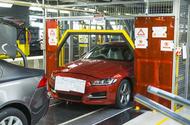Jaguar has committed to building its new all-electric XJ at Castle Bromwich
Falling demand globally and factory shutdowns are primary causes, as industry braces for Brexit
Car manufacturing in the UK fell by 20.1% in the first six months of 2019, caused by downturns worldwide and April’s widespread factory shutdowns, which were pulled forward in anticipation of the March Brexit deadline.
By the end of the year, UK car making is expected to be down approximately 15% year-on-year, with 1.37m units set to be produced.
It has been a largely gloomy year so far for UK car manufacturing. Honda announced it will shut its Swindon plant in 2021, while Nissan pulled plans to make the next X-Trail in Sunderland.
But earlier this month, Jaguar Land Rover bucked the trend by announcing major investment in its Castle Bromwich plant. Mike Hawes, chief executive of Society of Motor Manufacturers and Traders, commented: “Jaguar Land Rover is an outlier and a rare piece of good news across the UK industry. It’s hugely welcome. But the underlying trend is not so good.”
The broader outlook for UK car manufacturing very much depends on the outcome of Brexit, says the SMMT. If there was a favourable Brexit deal and transition period, UK car production is expected to rise to 1.42 million by 2021.
But, say figures from data firm Auto Analysis, if we leave Europe with no deal and turn to WTO rules, output is forecast to fall around 30% on recent levels to 1.07 million units by 2021. If that were to happen, it would be the lowest production figures since the 1980s.
Hawes said: “Automotive manufacturing is one of the UK’s most important economic assets, delivering an annual £18.6 billion to the economy, supporting local communities and employing 168,000 people in high value jobs, with the average salary some 40% higher than the national average. Automotive remains the UK’s single biggest exporter of goods, trading with some 160 countries worldwide and accounting for more than 14% of total exports.
“This success is dependent on free and frictionless trade afforded by the EU single market and customs union. A ‘no deal’ Brexit would mean the immediate imposition of tariffs costing some £4.5 billion a year and an end to the seamless movement of goods. Any potential disruption at the border would throw just-in-time manufacturing into chaos, undermining the sector’s competitiveness and putting profitability and jobs at risk.”
Top-line UK manufacturing figures
Year to date, 666,521 cars have been built in 2019, compared to 834,573 in the same period last year, according to figures by the SMMT.
Of that number, 133,203 cars were built for the UK market, a 16.4% drop compared to 2018. There were 533,318 cars exported, a decline of 21%. The percentage of cars made which are exported remains consistent at around 80%.
Exports to a number of key global markets also fell in the first six months of 2019. Hawes said exports to China, which dropped 53.1%, was one of the most concerning given its global importance to the car industry. Exports to America fell 12.9%. The UK’s biggest market, the EU also declined by 15.6%. However, the EU still accounts for 57% of all UK car exports.
Today’s figures confirm that June marks 13 consecutive months of decline in UK car manufacturing. The number of cars produced in June fell 15.1% year-on-year, but home demand rose by 17.8%. This anomaly is a result of a particularly poor June last year, a month hit by preparation for the WLTP emissions test.
Investment stalling
Figures released today also show investment into the sector has almost stopped in the first half of the year. Newly pledged investment amounts to £90m, compared to £374.3m in the same period last year and £647m in 2017.
Investment so far this year includes £23m of government funding for electrification projects, plus a couple of smaller, unnamed suppliers. Jaguar Land Rover’s announcement was only this month so does not fall into this figure.
Hawes said: “We expected a decline in investment [because of product cycles]. We are not blaming it entirely on Brexit but the downturn has been precipitous. A ‘no deal’ is causing investors to sit on their hands.”
New SMMT data also reveals that the UK car industry has already spent £330m on Brexit contingency plans. This figure includes stockpiling materials and components, securing warehouse capacity. The moving of annual plant shutdowns from the summer to April was also a significant cost for affected car makers.
Read more
Brexit contingency plans have cost UK car industry £330m
Electric Jaguar XJ confirmed, to be built at Castle Bromwich
Source: Autocar
